Background
Samuel Bowles was born on January 6, 1939, in New Haven, Connecticut. He spent his early childhood in rural areas of New England and lived for a while in India with his parents during the early 1950s.

New Haven, CT 06520, United States
Samuel Bowles studied at Yale University. He got a Bachelor of Arts.
Cambridge, MA, United States
Samuel Bowles studied at Harvard University. He got a Doctor of Philosophy.
Samuel Bowles
Samuel Bowles



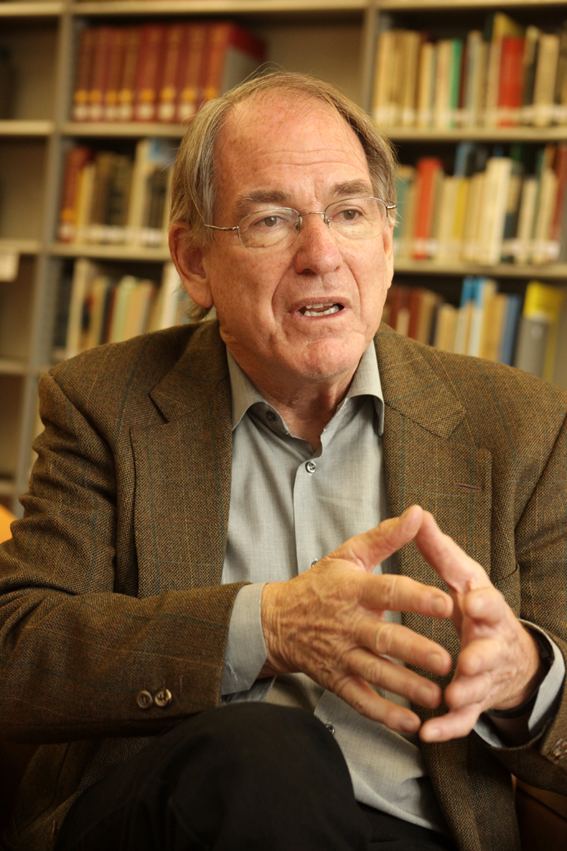










(In a unique approach to microeconomic theory, this book c...)
In a unique approach to microeconomic theory, this book constructs major problems in mathematical programming, the theory of consumer demand, the theory of production, and welfare economics.
https://www.amazon.com/Problems-Microeconomic-Advanced-Textbooks-Economics-ebook/dp/B01D88X0C0/ref=sr_1_1?dchild=1&keywords=Notes+and+Problems+in+Microeconomic+Theory&qid=1589208666&s=digital-text&sr=1-1
1970
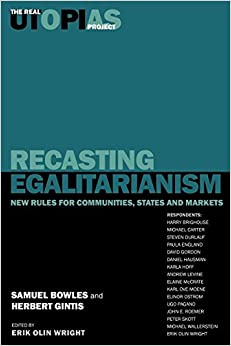
(In "Recasting Egalitarianism, part of Verso's Real Utopia...)
In "Recasting Egalitarianism, part of Verso's Real Utopias" series, economists Samuel Bowles and Herbert Gintis diagnose the current malaise of the Left as a result of the obsolescence of its traditional economic models
https://www.amazon.com/Recasting-Egalitarianism-Communities-Markets-Utopias/dp/185984863X/ref=sr_1_1?dchild=1&keywords=Recasting+Egalitarianism%3A+New+Rules+for+Communities%2C+States%2C+and+Markets&qid=1589887776&sr=8-1
1999
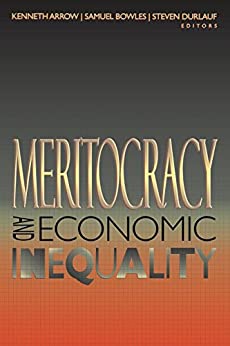
(Most Americans strongly favor equality of opportunity if ...)
Most Americans strongly favor equality of opportunity if not the outcome, but many are wary of poverty's seeming immunity to public policy. This helps to explain the recent attention paid to cultural and genetic explanations of persistent poverty, including claims that economic inequality is a function of intellectual ability, as well as more subtle depictions of the United States as a meritocracy where barriers to achievement are personal - either voluntary or inherited - rather than systemic. This volume of original essays by luminaries in the economic, social, and biological sciences, however, confirms mounting evidence that the connection between intelligence and inequality is surprisingly weak and demonstrates that targeted educational and economic reforms can reduce the income gap and improve the country's aggregate productivity and economic well-being.
https://www.amazon.com/Meritocracy-Economic-Inequality-Kenneth-Arrow-ebook/dp/B07DSMSDSN/ref=sr_1_2?dchild=1&keywords=Meritocracy+and+Economic+Inequality&qid=1589208772&s=digital-text&sr=1-2
2000
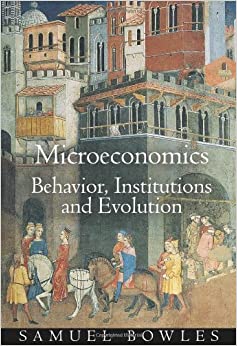
(In this novel introduction to modern microeconomic theory...)
In this novel introduction to modern microeconomic theory, Samuel Bowles returns to the classical economists' interest in the wealth and poverty of nations and people, the workings of the institutions of capitalist economies, and the coevolution of individual preferences and the structures of markets, firms, and other institutions.
https://www.amazon.com/Microeconomics-Institutions-Evolution-Roundtable-Behavioral-ebook/dp/B004P1JTES/ref=sr_1_1?dchild=1&keywords=Microeconomics%3A+Behavior%2C+Institutions%2C+and+Evolution&qid=1589208881&s=digital-text&sr=1-1
2004
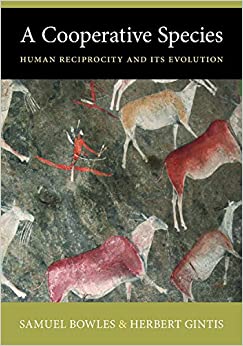
(In "A Cooperative Species," Samuel Bowles shows that the ...)
In "A Cooperative Species," Samuel Bowles shows that the central issue is not why selfish people act generously, but instead how genetic and cultural evolution has produced a species in which substantial numbers make sacrifices to uphold ethical norms and to help even total strangers.
https://www.amazon.com/Cooperative-Species-Human-Reciprocity-Evolution-ebook/dp/B0050PADW0/ref=sr_1_1?dchild=1&keywords=A+Cooperative+Species%3A+Human+Reciprocity+and+Its+Evolution&qid=1589208956&s=digital-text&sr=1-1
2011
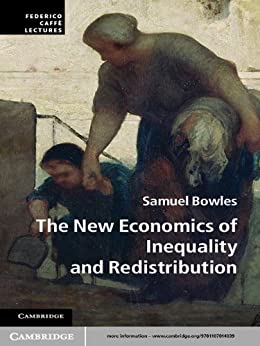
(Incorporating the latest results from behavioral economic...)
Incorporating the latest results from behavioral economics and the new microeconomics of credit and labor markets, Bowles shows that escalating economic disparity is not the unavoidable price of progress. Rather it is policy choice - often a very costly one. Here drawing on his experience both as a policy advisor and an academic economist, he offers an alternative direction, a novel and optimistic account of a more just and better working economy.
https://www.amazon.com/Economics-Inequality-Redistribution-Federico-Lectures-ebook/dp/B008R9SQZ2/ref=sr_1_1?dchild=1&keywords=The+New+Economics+of+Inequality+and+Redistribution+Samuel+Bowles&qid=1589209086&s=digital-text&sr=1-1
2012
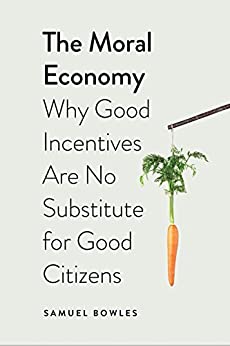
(Bowles shows that crowding out occurs when the message co...)
Bowles shows that crowding out occurs when the message conveyed by fines and rewards is that self-interest is expected, that the employer thinks the workforce is lazy, or that the citizen cannot otherwise be trusted to contribute to the public good. Using historical and recent case studies as well as behavioral experiments, Bowles shows how well-designed incentives can crowd in the civic motives on which good governance depends.
https://www.amazon.com/Moral-Economy-Incentives-Substitute-Citizens-ebook/dp/B01EUYN5GM/ref=sr_1_1?dchild=1&keywords=The+Moral+Economy%3A+Why+Good+Incentives+Are+No+Substitute+for+Good+Citizens&qid=1589209171&s=digital-text&sr=1-1
2016
Samuel Bowles was born on January 6, 1939, in New Haven, Connecticut. He spent his early childhood in rural areas of New England and lived for a while in India with his parents during the early 1950s.
Samuel Bowles studied at Yale University. He got a Bachelor of Arts in 1960. Also, Samuel graduated from Harvard University, and he got there a Doctor of Philosophy in 1965.
In the early 1960s, Samuel Bowles worked for three years as a high school teacher in northern Nigeria. Then Samuel taught economics at Harvard from 1965 to 1974. Then Samuel worked at the University of Massachusetts. Also, he served as a professor at the University of Siena from 2002 to 2010.
He continues to teach. Samuel Bowles is a research professor at the Santa Fe Institute. From 2000 to 2003, Samuel was a director of the Economics Program. He currently heads the Behavioral Sciences Program. Besides, Samuel gives lectures at the University of Massachusetts.
In 1993 Samuel Bowles founded Research Network on Effects of Inequality on Economic Performance. He was also a co-director.
In addition to Samuel Bowles' teaching, he is a writer. In 1969 Bowles published his first book, Planning Educational Systems for Economic Growth.
His next book, Notes, and Problems in Microeconomic Theory, written with David Kendrick, was published in 1970.
Bowles collaborated with David Gordon and Thomas Weisskopf on a series of papers studying the stagnation of the United States economy in the late 1970s and the subsequent expansion of the rightist political-economic policy. The papers were collected in two volumes, Beyond the Wasteland, and After the Waste Land. His collaborations with Herbert Gintis also continued, resulting in books such as Democracy and Capitalism.
His scholarly papers have appeared in Science, Nature, New Scientist, American Economic Review, Theoretical Population Biology, Games and Economic Behavior, Journal of Theoretical Biology, Journal of Political Economy, Quarterly Journal of Economics, Behavioral and Brain Science, Philosophy and Public Affairs, Journal of Public Economics, Theoretical Primatology, Proceedings of the National Academy of Sciences, Harvard Business Review, Journal of Economic Literature, Journal of Economic Perspectives, Current Anthropology, and the Economic Journal.
His most recent book is The Moral Economy: Why good laws are no substitute for good citizens. Other recent books include A Cooperative Species, The new economics of inequality and redistribution, and Microeconomics: Behavior, Institutions, and Evolution. He is currently working on Equality's Moment: The origins and future of economic disparity and political hierarchy.
Samuel Bowles has advised the governments of Cuba, South Africa, and Greece, to Robert Kennedy, Jesse Jackson, the Congress of South African Trade Unions, and South African President Nelson Mandela in the field of economics.
In 2013 Samuel Bowles founded Curriculum Open-access Resources for Economics. With this international collaboration of economists, Samuel Bowles is currently developing a new curriculum for undergraduate economics.
Samuel Bowles is well-known as the writer, economist, and professor of economics. He founded "Research Network on Effects of Inequality on Economic Performance" and "Curriculum Open-access Resources for Economics."
Samuel Bowles got a Chancellor's Bronze Medal from the University of Massachusetts in 1979. In 1980-1981 he got a Guggenheim fellowship and a fellowship of the German Marshall Fund of the United States in 1983. Samuel got a University of Massachusetts Faculty fellowship in 1986.
(In this novel introduction to modern microeconomic theory...)
2004(In "A Cooperative Species," Samuel Bowles shows that the ...)
2011(Bowles shows that crowding out occurs when the message co...)
2016(In "Recasting Egalitarianism, part of Verso's Real Utopia...)
1999(Incorporating the latest results from behavioral economic...)
2012(In a unique approach to microeconomic theory, this book c...)
1970(Most Americans strongly favor equality of opportunity if ...)
2000In the early 1960s, Samuel Bowles became active in the civil rights movement.
In one interview, Samuel said: "Through public education and political discourse, governments are heavily involved in shaping preferences. We cannot be indifferent to the preferences we and our fellow citizens have."
In 1968 Samuel Bowles was a founding member of the Union for Radical Political Economics when his economic ideas began to evolve. Marxism became an intellectual influence on Samuel and his contemporaries when he was in the search for new economic ideas. His work continued to approach economics from a Marxist perspective, and he published several papers outlining this outlook. With the publication of Schooling of Capitalist America, co-written with Gintis, Samuel Bowles's rejection of orthodox economics was complete. In this work, Samuel and Gintis explored the relationship between capitalism and the educational system. In so doing, they coined the term "corresponding principle," suggesting that school systems tend to adopt a hierarchical structure that mirrors the structure found in the labor market of a capitalist economy. Using this principle, they critiqued liberal educational philosophy, concluding that educational reform is incompatible with a capitalist society.
In his book, The Moral Economy: Why Good Incentives Are No Substitute for Good Citizens, Samuel charges that economists, jurists, and policymakers often don't hedge their interests. They have come to rely excessively on incentives based on the proposition that people's behavior is entirely self-interested and amoral. Standard economic analysis indicates that policy should be based solely on the self-interest assumption. Also, he claims is that policies based on the assumption that people are motivated primarily or entirely by selfish motives often work poorly and sometimes backfire. He suggested that such policies may promote selfishness and amorality.
Samuel Bowles studied the way that people are motivated by selfishness and the desire to maximize their income as compared to altruism and the desire to do a good job and be well regarded by others. These experiments show that despite traditional economic theories, market incentives destroy cooperation and are less efficient than voluntary, altruistic behavior" in most cases." People act not only for material interests, but also "to constitute themselves as dignified, autonomous, and moral individuals."
Samuel opposed that inequality goes hand-in-hand with a nation's economic success and that reducing economic inequalities inevitably compromises efficiency. He thought that "East Asian countries with level distributions of income have dramatically outperformed Latin American countries with less equal income distributions. Investments in the nutrition, health, and education of poor children have produced not only more economic opportunity but higher economic performance. Indeed, emerging economic theory suggests that inequality may have adverse effects, blunting productive incentives, and fueling costly conflicts between haves and have-nots."
Quotations:
"People today think that economics should be addressing inequality, climate change, and the future of work. But none of these issues are taught to introductory economics students."
"The idea of doing good because inconsequential, that it's not for consequential reasons, but because it's the right thing to do, I think that's a lot of our morality."
Quotes from others about the person
Joshua Greene: "Sam Bowles is a visionary thinker who has done more than anyone else I know to unite the social sciences."

Chester Bliss Bowles was an American advertising entrepreneur, public official, and noted liberal politician.
David Kendrick is the Yarborough Centennial Professor of Liberal Arts at the University of Texas at Austin.
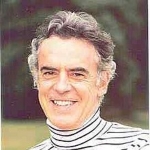
David Gordon was an American economist and professor at the Graduate Faculty of the New School for Social Research.

Thomas Weisskopf is an emeritus professor of economics at the University of Michigan and a long-time member of the Democratic Socialists of America.

Herbert Gintis is an external professor, Santa Fe Institute, and professor of Economics, Central European University.

Arthur MacEwan is a professor of Economics at the University of Massachusetts Boston.

Stephen Resnick was a professor of Economics Emeritus at the University of Massachusetts.

Richard Wolff is a professor's emeritus of Economics at the University of Massachusetts Amherst, and a visiting professor in the Graduate Program in International Affairs of the New School University.
Richard Edwards is director of the Center for Great Plains Studies at the University of Nebraska Lincoln. He has written twelve books and numerous articles and has spent a lifetime working in academia.
